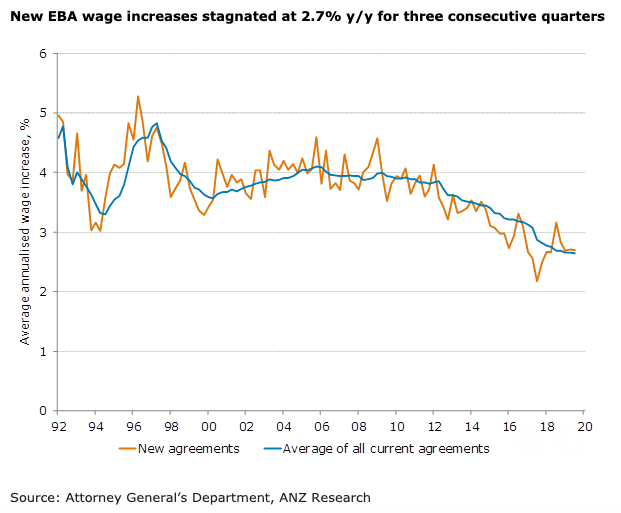The average annual wage increase (AAWI) under new enterprise bargaining agreements (EBAs) has idled at 2.7 percent for the three quarters to September 2019. The private sector recorded a slight decline to 2.7 percent in Q3, which was largely offset by a small rise in the public sector to 2.6 percent, ANZ Research.
The average annual wage rise for all current agreements slowed to a record low of 2.6 percent in Q3. The EBA data are consistent with the weakening in the wage price index to 2.2 percent y/y in Q3.
The AAWI in the private sector has gradually declined over the past three quarters to 2.7 percent in Q3. This was largely offset by a small rise in the public sector AAWI to 2.6 percent, although this is still well down on the 3.3 percent recorded a year ago.
The Q3 results were mixed across industries. The largest declines in the AAWI under new EBAs were in arts and recreation (-0.5ppt), accommodation and food services (-0.4ppt), and transport, postal and warehousing (-0.4ppt).
The largest improvement was in rental, hiring and real estate (+1.4ppt to 3.5 percent), but this AAWI is still less than half of what it was a year ago. Construction, other services, utilities and retail also recorded rises in the AAWI for new agreements.
Only three out of the 19 industries had an AAWI at or above 3 percent: construction; rental, hiring and real estate; and utilities.
"We do not expect a material pick-up in wage growth any time soon," the report further commented.



 FxWirePro: Daily Commodity Tracker - 21st March, 2022
FxWirePro: Daily Commodity Tracker - 21st March, 2022  Philippine Economy Slows in Late 2025, Raising Expectations of Further Rate Cuts
Philippine Economy Slows in Late 2025, Raising Expectations of Further Rate Cuts  Asian Currencies Hold Firm as Dollar Rebounds on Fed Chair Nomination Hopes
Asian Currencies Hold Firm as Dollar Rebounds on Fed Chair Nomination Hopes  Indonesia Stocks Face Fragile Sentiment After MSCI Warning and Market Rout
Indonesia Stocks Face Fragile Sentiment After MSCI Warning and Market Rout  UK Vehicle Production Falls Sharply in 2025 Amid Cyberattack, Tariffs, and Industry Restructuring
UK Vehicle Production Falls Sharply in 2025 Amid Cyberattack, Tariffs, and Industry Restructuring  Asia Stocks Pause as Tech Earnings, Fed Signals, and Dollar Weakness Drive Markets
Asia Stocks Pause as Tech Earnings, Fed Signals, and Dollar Weakness Drive Markets  U.S. Eases Venezuela Oil Sanctions to Boost American Investment After Maduro Ouster
U.S. Eases Venezuela Oil Sanctions to Boost American Investment After Maduro Ouster  Trump Threatens 50% Tariff on Canadian Aircraft Amid Escalating U.S.-Canada Trade Dispute
Trump Threatens 50% Tariff on Canadian Aircraft Amid Escalating U.S.-Canada Trade Dispute 





























